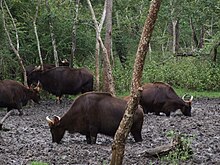
A mineral lick (also known as a salt lick) is a place where animals can go to lick essential mineral nutrients from a deposit of salts and other minerals. Mineral licks can be naturally occurring or artificial (such as blocks of salt that farmers place in pastures for livestock to lick). Natural licks are common, and they provide essential elements such as phosphorus and the biometals (sodium, calcium, iron, zinc, and trace elements) required for bone, muscle and other growth in herbivorous mammals such as deer, moose, elephants, hippos, rhinos, giraffes, zebras, wildebeests, tapirs, woodchucks, fox squirrels, mountain goats, porcupines, and frugivorous bats.[1] Such licks are especially important in ecosystems such as tropical rainforests and grasslands with poor general availability of nutrients. Harsh weather exposes salty mineral deposits that draw animals from miles away for a taste of needed nutrients. It is thought that certain fauna can detect calcium in salt licks.[2]
- ^ Bravo, Adriana; Harms, Kyle E.; Stevens, Richard D.; Emmons, Louise H. (2007). "Collpas: Activity Hotspots for Frugivorous Bats (Phyllostomidae) in the Peruvian Amazon". Biotropica. 40 (2). Wiley: 203–210. doi:10.1111/j.1744-7429.2007.00362.x.
- ^ C. Michael Hogan. 2010. Calcium. eds. A.Jorgensen, C.Cleveland. Encyclopedia of Earth. National Council for Science and the Environment.